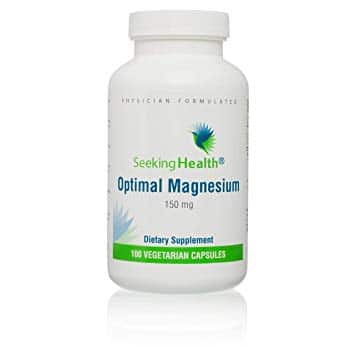Main Things to Know
Magnesium is a well-know mineral, for good reason. It’s incredibly important to the human body. In fact, it plays a major role in the function of 300+ enzymes that help to regular daily metabolic functions. What does that mean? Basically, our body relies on this trace mineral in big ways each day.
Magnesium also plays an important role in bone maintenance and development. Many people take Vitamin D supplements but aren’t aware that sufficient magnesium levels are crucial for Vitamin D metabolism.

Although there are many foods that are a decent source of magnesium, due to growing practices and dietary habits in the United States, roughly 50% of the population is consuming a magnesium-deficient diet, and some studies suggest that up to 75% of Americans aren’t meeting the dietary requirements for this important mineral (although a true deficiency, rather than sub-optimal levels, is much less common).
Symptoms of Magnesium Deficiency
- Anorexia
- Anxiety
- Apathy
- Difficulty swallowing
- Fatigue
- High blood pressure
- Irregular or rapid heartbeat
- Irritability
- Lethargy
- Loss of Appetite
- Memory problems
- Muscle cramps and/or weakness
- Nausea and/or vomiting
- Seizures and/or tremors
- Vertigo
Clinical Conditions Associated with a Deficiency
Several clinic conditions have been shown to be associated with suboptimal/deficient levels of magnesium. It is also important to note that certain medications like certain PPIs (proton pump inhibitors), diuretics, blood pressure medications, birth control pills, and antibiotics, can deplete magnesium. Conditions like Celiac disease, Crohn’s disease, anorexia, or other malabsorption issues may contribute to lower levels.
- Brain-related/mental diseases and disorders: ADHD, Dementia, Depression, Epilepsy, Migraines, Parkinson’s
- Arterial and cardiac disorders: Atherosclerosis, Coronary artery disease, Cardiac arrhythmia, Chest pain (angina), Hypertension
- Other: Asthma, Chronic fatigue syndrome, Colon Cancer, Fibromyalgia, Osteoporosis, Premenstrual syndrome (PMS), Sleep disorders, Type II diabetes
Foods High in Magnesium
If you are looking to get more magnesium from your diet, consider adding in more of the following foods. Foods from farms with good growing practices may also be higher in this mineral, as the soil is better maintained, and therefore less deplete of nutrients. Note that certain foods and diets can deplete magnesium. For example, alcohol, coffee, and a high-sugar diet may all contribute to a magnesium deficiency.
- Almonds, Cashews and Hazelnuts
- Bananas
- Beans
- Broccoli
- Cocoa
- Egg yolk
- Fish oil
- Green vegetables
- Milk
- Mushrooms
- Seeds: chia, flaxseed, pumpkin, sesame, and sunflower
- Sweet corn
- Whole grains such as brown rice and oats
When to Talk to a Provider
If you’re experiencing symptoms that could be related to low magnesium, or are taking a Vitamin D supplement, talk to a provider about supplementing with magnesium and which form of magnesium may be best for you. Overdosing on magnesium is rare, and common signs are diarrhea, nausea, and stomach cramps. Individuals with kidney problems are more at risk to experience magnesium toxicity. It is always best to check with a healthcare professional before starting a supplement regimen.




